
WEHI, previously known as the Walter and Eliza Hall Institute of Medical Research, and as the Walter and Eliza Hall Institute, is Australia's oldest medical research institute. Sir Frank Macfarlane Burnet, who won the Nobel Prize in 1960 for his work in immunology, was director from 1944 to 1965. Burnet developed the ideas of clonal selection and acquired immune tolerance. Later, Professor Donald Metcalf discovered and characterised colony-stimulating factors. As of 2015, the institute hosted more than 750 researchers who work to understand, prevent and treat diseases including blood, breast and ovarian cancers; inflammatory diseases (autoimmunity) such as rheumatoid arthritis, type 1 diabetes and coeliac disease; and infectious diseases such as malaria, HIV and hepatitis B and C.

Harald von Boehmer was a German-Swiss immunologist best known for his work on T cells.

Young-Tae Chang is a South Korean chemist. He is a professor of chemistry at Pohang University of Science and Technology (POSTECH) and Associate Director under Kim Kimoon at the Center for Self-assembly and Complexity at the Institute for Basic Science located on the POSTECH campus.
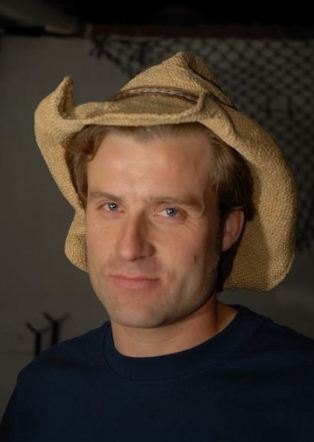
Jared Franklin Purton was an Australian-born immunologist who contributed to the understanding of how T cells function through his academic research. After his death in a car accident in 2009, the Jared F. Purton Foundation was set up in his memory to support charitable causes in the San Diego area.

Hee-sup Shin is a South Korean neuroscientist whose work focuses on brain research of genetically engineered mice via gene knockout in order to better understand the human brain. His research resulted in him being named a National Scientist by the Korean Ministry of Science and Technology. He is a former co-director of the Center for Cognition and Sociality leading the Social Neuroscience Group in the Institute for Basic Science (IBS) located at Korea Advanced Institute of Science and Technology (KAIST).
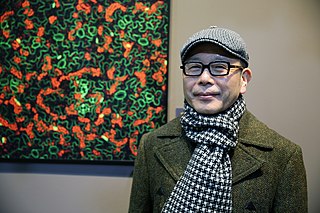
Hong Gil Nam is a South Korean biologist teaching in the Department of New Biology of Daegu Gyeongbuk Institute of Science and Technology and leading research as director of the Center for Plant Aging Research. His research interests include comparative aging in diverse kingdoms, including plant and animals, to reveal aging mechanisms among species, cross-kingdom interaction between plants and animals, and biochemistry at nano and micro levels. He is the founder and former director of the Biological Research Information Center, a member of the Korean Academy of Science and Technology, and has served on the editorial board in Molecular Plant since 2013.

Akiko Iwasaki is a Sterling Professor of Immunobiology and Molecular, Cellular and Developmental Biology at Yale University. She is also a principal investigator at the Howard Hughes Medical Institute. Her research interests include innate immunity, autophagy, inflammasomes, sexually transmitted infections, herpes simplex virus, human papillomavirus, respiratory virus infections, influenza infection, T cell immunity, commensal bacteria, COVID-19 and Long COVID.

Arturo Casadevall is a Bloomberg Distinguished Professor of Molecular Microbiology & Immunology and Infectious Diseases at the Johns Hopkins Bloomberg School of Public Health and Johns Hopkins School of Medicine, and the Alfred and Jill Sommer Professor and Chair of the W. Harry Feinstone Department of Molecular Microbiology and Immunology at the Johns Hopkins Bloomberg School of Public Health. He is an internationally recognized expert in infectious disease research, with a focus on fungal and bacterial pathogenesis and basic immunology of antibody structure-function. He was elected a member of the National Academy of Sciences in 2022.
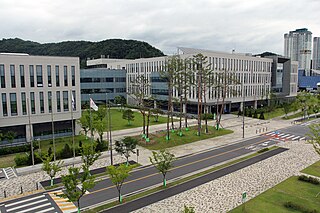
The Institute for Basic Science is a Korean government-funded research institute that conducts basic science research and relevant pure basic research. Comprising approximately 30 research centers with more than 60 research groups across the nation and a headquarters in Daejeon, IBS has approximately 1,800 researchers and doctoral course students. Around 30% of the researchers are from countries outside South Korea. The organization is under the Ministry of Science and ICT.
Persephone Borrow is a viral immunologist specialising in T-cell responses in acute and early HIV-1 infections. She has been at the University of Oxford since 2005 and in 2016 was made a professor there.

Rafi Ahmed is an Indian-American virologist and immunologist. He is the Charles Howard Candler Professor of Microbiology and Immunology at Emory University, where he is also the director of the Emory Vaccine Center and a Georgia Research Alliance Eminent Scholar in Vaccine Research. In 2009, he was elected to the National Academy of Sciences.
Howard Chi Hang is an American chemist and professor in the Department of Immunology and Microbiology and Department of Chemistry at The Scripps Research Institute. He was previously Richard E. Salomon Family Associate Professor and the head of the Laboratory of Chemical Biology and Microbial Pathogenesis at the Rockefeller University in New York City. He won the Eli Lilly Award in Biological Chemistry in 2017.
Shane Patrick Crotty is a professor of immunology in the Center for Infectious Disease and Vaccine Research at La Jolla Institute for Immunology.
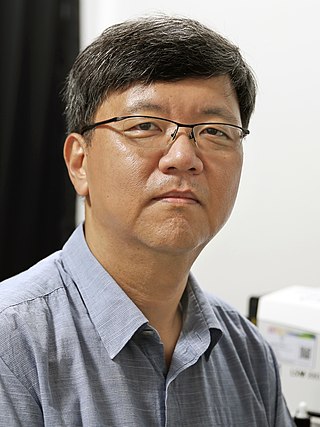
Myung Kyungjae is a biologist researching DNA repair pathways at the molecular level. He is a Distinguished Professor at the Ulsan National Institute of Science and Technology (UNIST) and the Director of the IBS Center for Genomic Integrity located on the UNIST campus. He is on the editorial board of various peer-reviewed journals and is a member of multiple scientific societies.
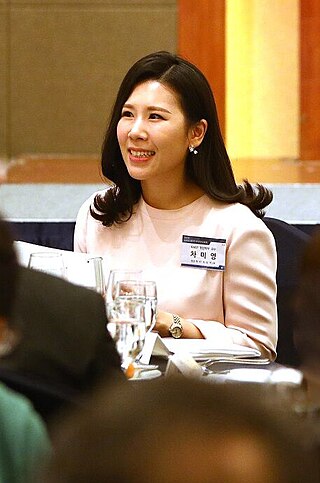
Cha Meeyoung, sometimes known as Mia, is an associate professor at KAIST in the School of Computing and a chief investigator in the Pioneer Research Center for Mathematical and Computational Sciences at the Institute for Basic Science. Her research focuses on network and data science with an emphasis on modeling, analyzing complex information propagation processes, machine learning-based computational social science, and deep learning. In June 2024, she will become the scientific director of the Max Planck Institute for Security and Privacy. She has served on the editorial boards of the journals PeerJ and ACM Transactions on Social Computing.

Choi Kiwoon is a theoretical particle physicist researching focusing on particle theory and cosmology. He was a research professor at Chonbuk National University and a full professor at KAIST. He is the founding director of the Institute for Basic Science Center for Theoretical Physics of the Universe. He is a member of the Korean Academy of Science and Technology.

Changjoon Justin Lee is an American neuroscientist specializing in the field of glioscience. He served as the Director of Center for Neuroscience at the Korea Institute of Science and Technology and later founded the WCI Center for Functional Connectomics as part of the World Class Institute Program. In 2015, he established the Center for Glia-Neuron Interaction before becoming co-director of the IBS Center for Cognition and Sociality and head of the Cognitive Glioscience Group in 2018. He has been on the editorial boards of the journals Molecular Brain and Molecular Pain and is a chief editor of Experimental Neurobiology.
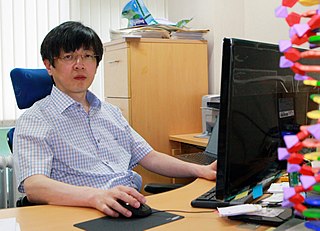
Kim Jin-Soo is a chemist, biologist, and entrepreneur. He was CEO and CSO, ToolGen, Inc., is a professor in the Department of Chemistry of Seoul National University and director of the Center for Genome Engineering. His research team has developed and improved several types of programmable nucleases, specifically zinc finger nucleases (ZFNs), TAL effector nucleases (TALENs), and RNA-guided engineered nucleases (RGENs). In 2018, he was a Clarivate Analytics Highly Cited Researcher in the cross-field category and in the biology and biochemistry category in 2019.
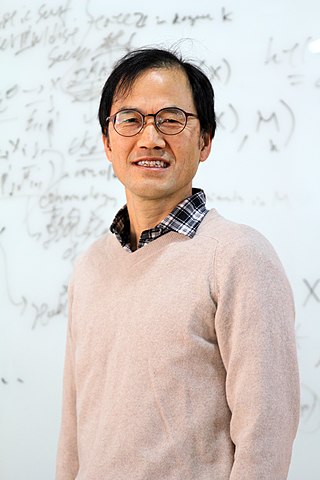
Oh Yong-Geun is a mathematician and distinguished professor at the Pohang University of Science and Technology and founding director of the IBS Center for Geometry and Physics located on that campus. His fields of study have been on symplectic topology, Floer homology, Hamiltonian mechanics, and mirror symmetry He was in the inaugural class of fellows of the American Mathematical Society and has been a member of Institute for Advanced Study, Korean Mathematical Society, and National Academy of Sciences of the Republic of Korea and is on the editorial boards of Journal of Gokova Geometry and Topology and Journal of Mathematics of Kyoto University.
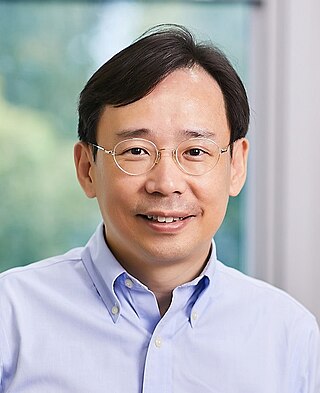
Eui-Cheol Shin is a South Korean medical immunologist, academic, and author. He is a professor at the Graduate School of Medical Science and Engineering at the Korea Advanced Institute of Science and Technology (KAIST), and director of The Center for Viral Immunology at the Institute for Basic Science (IBS), a Korean government-funded research institute.
















